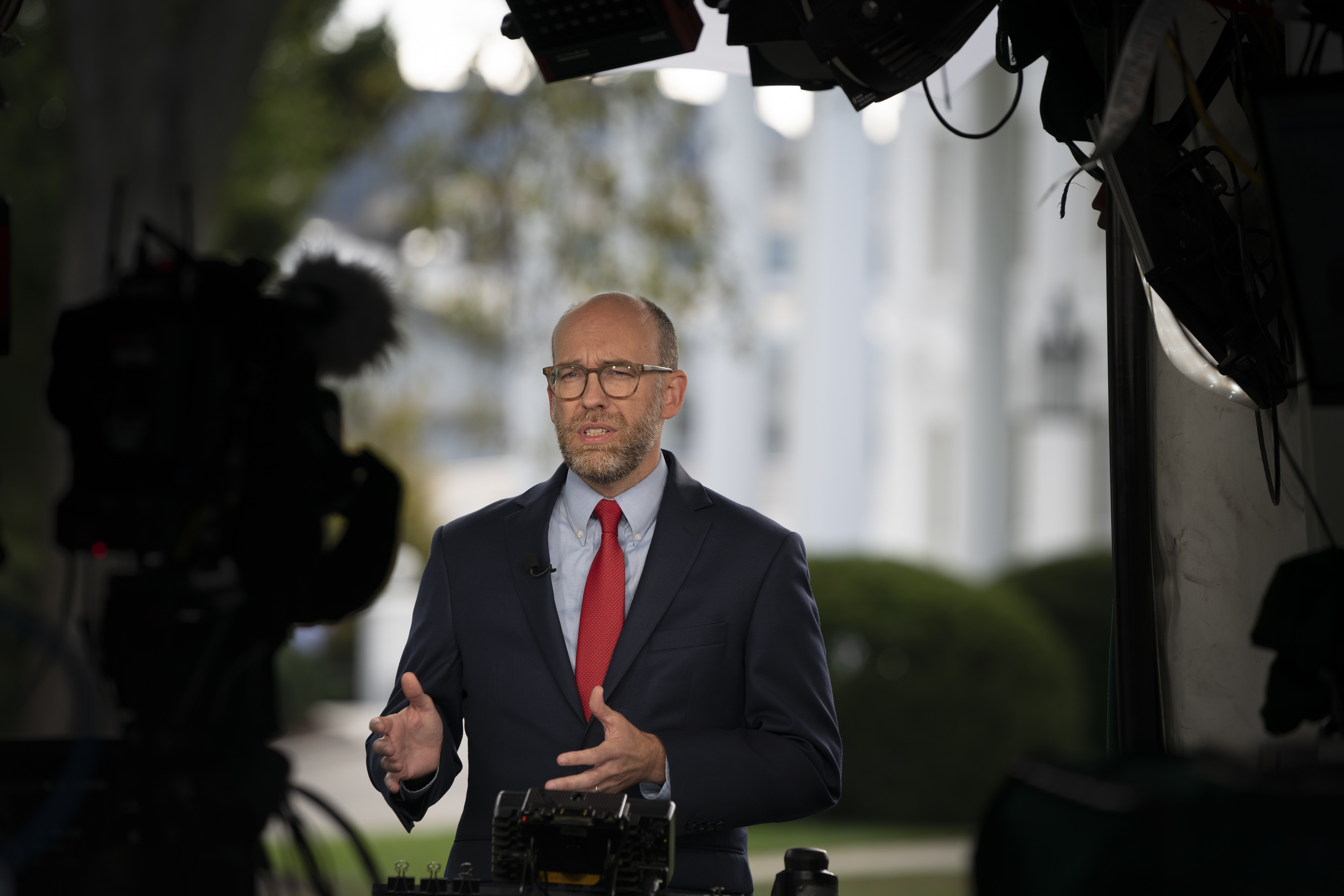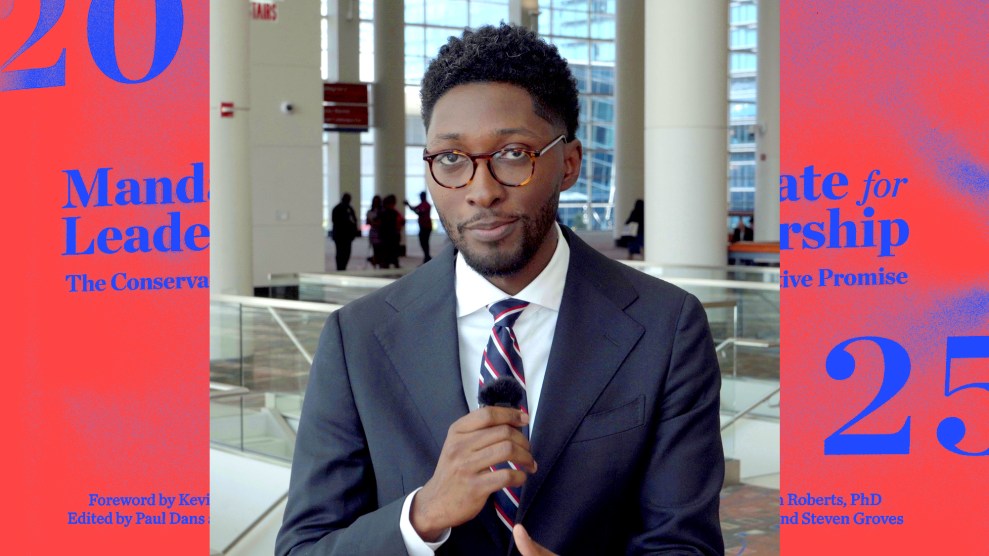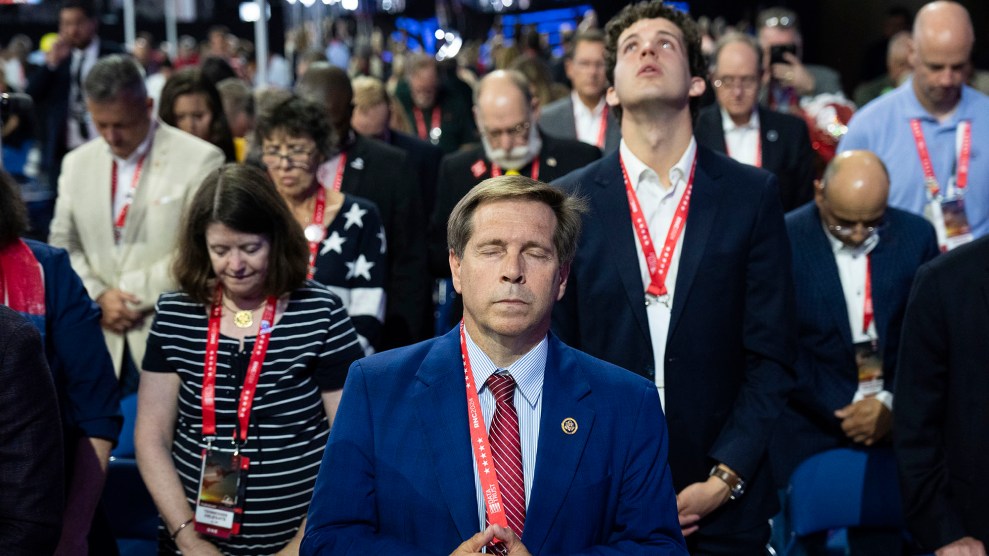Our November+December issue investigates the Christian nationalist movement that aspires to take over government at all levels, from school boards and state legislatures to Congress and the Supreme Court. Read the series of stories here.
In the waning days of the Trump presidency, Russell Vought, the outgoing director of the Office of Management and Budget, had a request.
After years in Washington, DC, soaking in the minutiae of policy, Vought had come to both know and loathe the bureaucracy. A rare voice in an administration committed to “draining the swamp” who had actual Beltway experience, he found in the Trump era he could put his expertise to use.
On November 20, 2020, Vought wrote to the head of the Office of Personnel Management for approval to reclassify dozens of career civil servant jobs within his agency. A few weeks before the 2020 election, President Donald Trump signed an executive order creating a new category of at-will employees—so-called Schedule F positions—which would be exempt from the rules designed to protect civil servants from partisan hatchetmen.
Despite Trump’s loss, Vought pushed to recategorize scores of OMB roles. To an outsider, this might have seemed like a technical adjustment. But in practice, reassignment would have stripped 415 employees—68 percent of the agency’s personnel—of work protections, effectively making it easier for political appointees to fire them. Vought called it “another step to make Washington accountable to the American people.”
In the end, Vought couldn’t get it done by inauguration. But this combination of lofty public rhetoric and ruthless behind-the-scenes gamesmanship has become his trademark. By the tail end of Trump’s turbulent four years in the White House, the OMB director had turned into one of the president’s most trusted and obsequious officials—an acolyte with a knack for making the half-formed schemes from his boss achievable.
As Trump runs for a second term, Vought’s years of faithful service haven’t gone unnoticed; his name has been widely floated for chief of staff, and he is a key policy adviser. One of the masterminds behind Project 2025—the Heritage Foundation’s presidential transition blueprint to overhaul the executive branch and usher in an ultraconservative agenda—Vought, an avowed Christian nationalist, is the man best positioned to realize Trump’s visions.
A wonk with a neatly trimmed beard and tortoiseshell glasses, Vought, 48, looks like a generic bureaucrat. He has referred to himself as the “boring budget guy” and to his coterie of paper pushers as a group of “propeller heads.” He can be self-effacing, claiming that if he can get the job done, anyone can. But this modesty belies his strategic ability to bend the mechanics of government to the president’s will.
“What makes Vought especially dangerous is he combines ideological extremism with a familiarity and comfort with Washington’s political processes,” says Katherine Stewart, author of the forthcoming book Money, Lies, and God: Inside the Movement to Destroy American Democracy. “He knows how to undermine agencies, how to create new bureaucratic forces, how to block funding, and how to engage with other practical features of our political system.”
For the 920-page Mandate for Leadership policy playbook from Project 2025, Vought wrote a chapter that exults in the “enormous power” of the president and previews how a conservative administration would radically subjugate the federal government. He has also crafted a 180-day battle plan to arm an incoming president with hundreds of ready-to-go executive orders, regulations, and secretarial memos. Although the details remain secret, he has hinted at pre-plotted ways to enact Trump’s mass deportations, reclaim federal agencies’ independence, and deploy the US military domestically to police migrants (and, conceivably, quash protests).
“[Trump] has never had an army of people that could serve in government, believe fully in what he believes in, and can execute it with enemy fire that’s coming over the target,” Vought said in June on Steve Bannon’s War Room podcast, where he is a frequent guest. “We will give this next term [the potential for] something that the country has never seen before.”
Every president makes a mark on the civil service with the political appointees they select to lead government agencies. But Vought nurtures a far more expansive—and alarming—ambition: to institute a new governing paradigm predicated on unrestrained presidential authority. With Vought as the architect, Trump could take his “dictator” on “day one” aspirations beyond words, prosecuting political opponents while avoiding accountability for his own crimes.
In a second term, Trump—and Vought—would complete unfinished business, like the OMB shake-up. Trump left office before the agency could implement Schedule F, and the Biden administration rescinded the executive order. Former staff and experts warned it would have undermined institutional knowledge in favor of blind allegiance. Stuart Shapiro, who worked at OMB from 1998 to 2003 and is the author of Trump and the Bureaucrats: The Fate of Neutral Competence, still describes this first attempt to upend the agency as “a significantly traumatic event.”
Vought and the rest of the Project 2025 administration-in-waiting plan to revive Schedule F—and take it beyond the budget office. Potentially, 50,000 federal workers could be affected, their expert roles open to partisan MAGA loyalists ideologically vetted to ensure little resistance to Trump’s project for an imperial presidency. “It’s going to be groundbreaking,” Vought told Heritage President Kevin Roberts on a podcast last year.
For Vought, politics is downstream from religion. He sees a strong presidency as a way to bring forth a Christian nation. Vought opposes abortion and has referred to transgender identity as a “contagion.” He has suggested migration policy should be rooted in Judeo-Christian principles, with immigrants tested on their readiness to “assimilate.” If Trump wins, Vought wants to infuse the next conservative administration with the values of Christian nationalism—the conviction that the United States is bound to the teachings of Christ, from which all else follows.
“Vought could be one of the key figures leading us into a new and violently authoritarian future.”
Since leaving government, Vought has worked from the outside toward this goal. He founded the Center for Renewing America, part of the “nerve center” of MAGA groups laying the groundwork for Trump’s return. With the stated mission to “renew a consensus of America as a nation under God,” CRA is a player in a coalition advising Project 2025.
As much as Trump has tried to distance himself from the initiative in recent months, Vought’s prominent role in it—and his clear ties to the campaign—tell a different story. In May, the Republican National Committee picked Vought to be the policy director of their official 2024 platform. In a secretly recorded interview, Vought—thinking he was talking to prospective donors—told the British nonprofit Centre for Climate Reporting that Trump’s public disapproval of Project 2025 amounted to “graduate-level politics.” He also left no room for doubt as to his motivation for helping Trump get back to the White House: “I want to be the person that crushes the deep state.”
“Vought is maybe the most centrally connected hub in the wheel of what a second Trump administration would look like,” says Donald Moynihan, a professor of public policy at the University of Michigan who has been closely following Vought’s moves. In return for their service, Moynihan says, Vought and others in Trump’s orbit see him as “a destabilizing force that would allow them to fundamentally change much of America as a society—starting with American government.”

The youngest of seven children, Vought grew up in Trumbull, Connecticut. His father was an electrician and his mother a schoolteacher whom he credits with leading him “to the Lord” at the age of four. Vought attended Christian summer camps and later studied at Wheaton College, a private Christian school in Illinois. “Ever since college,” Vought said on the Founders Ministries’ podcast in January 2023, “I’ve been pouring into political theory, policy.”
In his senior year, Vought discovered German theologian Dietrich Bonhoeffer, who was imprisoned by the Nazis for his opposition to Hitler and died in a concentration camp shortly before the end of the war. Vought pored over Bonhoeffer’s letters and papers, borrowing from his thoughts on personal responsibility as an act of freedom in response to God’s call. Vought began to view politics as a necessary instrument of Christian morality. God did not want his followers to just melt into “armchair criticism” of the world, Vought said he learned from reading Bonhoeffer; instead, one should be “sitting and engaging and making mistakes [while] being willing to accomplish all that you can because that moment has been given to you by God.”
After graduating in 1998, Vought went to work on Capitol Hill. As a fiscal hawk staffer for GOP Sens. Dan Coats of Indiana and Phil Gramm from Texas, he immersed himself in legislative procedure and federal budget policy. Vought describes working for Gramm—an unbending free-market advocate known for his antagonistic style—as a “seminal experience.” Gramm, like Vought, took joy in combining technocratic arcana with conservative fundamentalism.
While serving as policy director for Texas Rep. Jeb Hensarling, Vought assisted in forging a federal budget overhaul bill lauded by conservatives as the “gold standard” for such a proposal. It called for slashing entitlement programs—including veteran and retirement benefits—by $1.8 trillion. The Center on Budget and Policy Priorities noted at the time the cuts would have represented the most severe in modern US history. Vought, Hensarling said, showed “unwavering devotion to the conservative principles.”
In 2004, Vought got a JD from George Washington University as a prelude to a steady rise through leadership positions. He worked in the House Republican Study Committee, the bulwark of right-wing strategy in Congress, then chaired by Indiana Rep. Mike Pence. For the caucus, Vought helped craft Operation Offset, a deficit-reduction plan proposal for Hurricane Katrina relief that would have cut billions of dollars in assistance programs for low-income families, including Medicaid. He defined the job as being the “aide-de-camp in [Congress members’] legislative skirmishes.”
Still, by 2010, Vought had grown frustrated. There was an unwillingness, he believed, among Republican establishment figures to really embrace ideological fights. He transitioned from apparatchik to rebel, joining Heritage Action for America, the foundation’s lobbying arm.
Operating from what the group called a “frat house” in Washington, Vought kept tabs and scorecards on Republicans in Congress based on their conservatism. He helped build a program to train conservative activists and campaigned to repeal the Affordable Care Act. When Sen. Bob Corker of Tennessee supported the arms reduction treaty with Russia, Vought angrily led a public charge against him as a RINO. Vought ranted about the cost of food stamp programs and opposed a Republican-sponsored highway bill, saying, “Long-term success of transformational conservative reforms is won and lost in trenches such as these.”
This time outside the government allowed him to speak honestly. Vought, it became clear, saw compromise as a sign of betrayal, fiscal clashes as power struggles, and conflict as opportunity for change. “We need elected officials free of calcified political assumptions of what is possible that reveal only their own level of accommodation with the liberal welfare state,” he wrote on the right-wing website RedState. “And we need officials with the courage to actually shape public opinion with urgency in favor of the policies that are necessary to bring the nation back from the brink.”
Vought quickly earned a reputation as a political brawler. A former Heritage colleague described him to the Washington Post as “ideological in the extreme.” (Vought and CRA did not respond to questions from Mother Jones.)
For some, his unflinching religious zeal might have proved disqualifying. But it was an asset to his former boss, Pence, an evangelical Christian who was now headed to the White House as Trump’s vice president. In the spring of 2017, with Pence’s endorsement, Trump tapped Vought to be deputy director of OMB, the epicenter of policy influence in the executive branch.
At Vought’s Senate confirmation hearing, Sen. Bernie Sanders (I-Vt.) grilled him over a 2016 blog post in which he defended his alma mater’s decision to put a professor on administrative leave for stating that Christians and Muslims worship the same God. “Muslims do not simply have a deficient theology,” Vought had written, they “stand condemned” for rejecting Jesus Christ. Vought—confirmed with a tiebreaking vote from Pence—later called that confrontation with the Vermont senator a “warning shot to Christians across the country.” After almost a year as the confirmed second-in-command at OMB, Vought became acting director in 2019 just after Trump chose then-Director Mick Mulvaney to be his chief of staff.
Inside the Trump administration, Vought came across as fiercely dedicated to the America First cause, even if it meant a colossal increase in the federal debt. Trump was prone to outbursts, but to Vought that aggression equaled power. Vought made it his mission to weaponize OMB on behalf of the president, who had long perceived the civil service bureaucracy as an obstacle to his haphazard rule. “We view ourselves as the president’s Swiss Army Knife,” he once said. “How do you come up with options that work and then talk through the pros and cons?” Vought interpreted his job as being inside Trump’s head—a “keeper of ‘commander’s intent.’”
“They’re going to push forward the boundaries of executive authority as far as it can go.”
This was a somewhat radical departure from the norm of OMB. Part of the Executive Office of the President, the agency’s 500 or so career civil servants pride themselves on acting as impartial advisers on policy, budget development and execution, and federal regulations. The work requires a tough balancing act between carrying out the administration’s vision and mitigating the risk of bad decisions. Under Vought, the agency’s culture of serving the presidency—not one particular president—was put to the test. “Vought was seen as valuing political support far more than the competence,” Shapiro writes in his book. OMB employees Shapiro interviewed describe leadership willing to push the boundaries of legality and ignore precedent with “budget gimmicks.”
“A lot of what [Trump] wanted to do and how…was contrary to all the traditions, past practices, and sometimes the law,” Sally Katzen, who served at OMB during the Clinton administration, says. “Trump’s political appointees didn’t want to hear [that] from [civil servants]. It’s like in so many different agencies when Trump was president: The people who knew anything were shut out of the process.” Katzen says Trump’s people “didn’t like hearing ‘no, you can’t; no, you shouldn’t.’”
Vought has made this frustration public. He criticized recalcitrant political appointees as “unwilling to think creatively” and harbored special contempt for career civil servants who worried about violating the law. “The nature of the bureaucracy is that if it isn’t status quo, it must be impossible,” Vought said in 2019. “However, most of the time, when we actually dig into the ways to do what the president wants, we find a way to accomplish it.” He views his legacy at OMB as reining in the broken bureaucracy and “pioneering the type of government that is necessary for an America-first, populist administration.”
Such willingness led Trump to ask Vought for help at key junctures. When rolling out an anti–critical race theory executive order barring anti-racism trainings for federal workers, Trump went to Vought, who dismissed internal resistance as activism to be beaten down. Vought was also behind Trump’s national emergency declaration to unlock billions of dollars in funds from the Pentagon to build the border wall without congressional approval; the office did so despite objection from White House counsels, whom Vought called his number-one adversary in the administration. (An appeals court later ruled the move illegal.)
“He very much knows how to use the executive office to push their policies,” says former Trump White House aide Olivia Troye, who describes Vought as one of Trump’s main enablers. “I think he’s also learned a lot of lessons from the first time around of how to go about doing things.”
These edge-of-the-envelope workarounds (or, as Vought put it, “innovative ways”) put OMB at the center of Trump’s first impeachment over the freezing of congressionally appropriated security assistance to Ukraine as part of a reelection bid to pressure President Volodymyr Zelenskyy into investigating the Biden family. Vought helped provide a legal rationale for the hold, ignoring concerns from national security and Department of Defense officials and, ultimately, in violation of the 1974 Impoundment Control Act (ICA) limiting the president’s authority to withhold funds appropriated by Congress. When subpoenaed to testify in the House impeachment inquiry, Vought declined and called it a “sham process.”
Now, Vought and his colleagues at CRA have been making a case for a future Trump administration to exert even more control over the federal budget. They claim the ICA, which Vought has characterized as “an albatross around a president’s neck,” is unconstitutional and should be overturned. In a second term, Trump has vowed to challenge the 50-year-old law and “squeeze the bloated federal bureaucracy.” By overriding spending decisions enacted by Congress, Trump would be more empowered to terminate agency programs he disagrees with.
“We are in an era where presidents already are too powerful,” Daniel Schuman, executive director of the American Governance Institute, wrote of Trump’s plan to seize control of impoundment power. “They’re going to push forward the boundaries of executive authority as far as it can go,” he tells me, adding, “They want a president to be like a king.”

Vought launched CRA in 2021, with Trump’s blessings and fundraising support, as a government-in-exile. The venture included other former Trump officials like ex–Department of Homeland Security Deputy Secretary Ken Cuccinelli and Jeffrey Clark, the Department of Justice attorney involved in the plot to subvert the 2020 election. (At a CRA event this year, Bannon praised Cuccinelli and others in the organization as “madmen.”) A sister entity of the deep-pocketed Conservative Partnership Institute, CRA boasted of raising $4.75 million from undisclosed donors last year.
Vought sees himself and CRA as the tip of the spear in a counterrevolution against the left. Everything from the FBI to the Department of Education has been gripped by a “post-constitutional order” imposed by “a corrupt Marxist vanguard.” In this view, wokeism has ruined America, and it’s incumbent on them to correct course. That means going even more on the offensive on cultural battles—pushing anti-CRT model legislation for school districts in several states and urging Republican governors to circumvent federal immigration law by declaring an “invasion” at the southern border.
It also requires wielding budgetary austerity to defund and bring to heel agencies conservatives believe have gone rogue. “I love to cut spending wherever it is,” Vought told the New Yorker, “and I like to cut spending the most in the bureaucracy.” What excited him most, he said, was “cutting the Department of Health and Human Services, the Department of Education.”
As the budget guru for House Republicans, Vought recently played a pivotal role in the debt ceiling showdown, displaying his acumen for budget-cutting power plays. Throughout the crisis, Vought pushed the insurgent Freedom Caucus to stand their ground and extract concessions for the conservative cause. Career disrupters like Rep. Matt Gaetz (R-Fla.) had in Vought a key ally. He “understands strategy and leverage as well as anyone in Washington, DC,” Gaetz said with delight. The battle culminated in the ousting of Republican House Speaker Kevin McCarthy.
At CRA, Vought has merged the culture battle of the new right with the old right’s love of small government. It was Vought who planted the original idea for what would become the House subcommittee on the weaponization of the federal government led by Rep. Jim Jordan of Ohio. And it was Vought’s organization that put forward a 2023 budget model outlining $9 trillion in spending cuts that reads like a list of grievances, from supposed “neo-racism and gender theory” programs to “climate extremism” policies. “America cannot be saved unless the current grip of woke and weaponized government is broken,” Vought wrote in his budget’s introduction. “That is the central and immediate threat facing the country.”
The document also offers a look into how Vought and his allies hope to manipulate federal agencies. When it comes to the FBI, the group would take away resources from counterintelligence and other areas “not salvageable due to a willful and repeated pattern of partisan lawfare waged against Americans.” At the same time, the budget proposed channeling more funding to the criminal investigative division to “thwart the increasing societal destruction caused by progressive policies at the state and local levels.”
In papers and legal memos, Vought and his associates have articulated a vast array of dubious maneuvers to remake American democracy, from ending the Department of Justice’s independence from the president to allowing federal troops to act as domestic law enforcement. Their plans to remove checks and balances and challenge long-established constraints on executive overreach, if realized, would unleash a Trump presidency battle-tested to turn gripe into policy.
If Trump returns to the White House, says Stewart, the author of Money, Lies, and God, “Vought could be one of the key figures leading us into a new and violently authoritarian future.”
Read our full investigation into the rise of Christian nationalism.

















